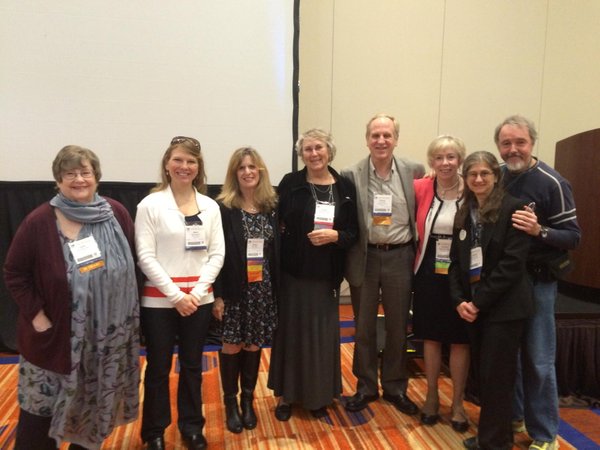|
Dear CALL IS members,
It is my pleasure to report on the TESOL 2016 convention. The
Electronic Village and Technology Showcase at the TESOL 2016 convention
were a rousing success. Our overall attendance for this year was 1,500+
participants over the 3-day convention with 50+ participants attending
virtually. Participants had a lot to choose from this year as CALL-IS
accepted more than 150 presentations for the EV Fairs, Miniworkshops,
Mobile Apps for Education, Developer’s Showcase, and EV Classics. The
most popular sessions this year included presentations on Google Drive,
Voicethread, Kahoot, and Memrise.
In addition to the sessions in the Electronic Village, we had 3
full days of panels offered in the Technology Showcase. Once again, we
brought back our Hot Topics panels, this year having five different
sessions on current and up-and-coming topics in the field of language
teaching and technology covering everything from flipped classrooms to
MOOCs to gaming and language learning. Our most popular Hot Topic
session this year was “Google and Beyond: A Collaborative Commentary on
Tech Resources for Language Learning.” The presenters in this session
shared with participants their favorite online tools for teaching and
learning languages.
Beyond our Hot Topics session, we had four InterSection panels,
including “Creating, Adapting, and Using Content for Mobile Apps,” led
by CALL-IS with MWIS; “Training Materials for ITAs,” led by ITA with
MWIS and CALL-IS; and “One Size Fits One: Incorporating Technology Into
ESP Courses,” led by ESPIS with VDMIS and CALL-IS. Our most popular
InterSection panel this year was a special panel, “Innovating Language
Learning Through Technology for Environmental Responsibility,” led by
CALL-IS in collaboration with SRIS and the Environmental Forum. In this
session, presenters demonstrated different applications and technologies
that could be used to engage learners in the language learning process
while educating them about environmental issues. Another well received
panel was this year’s academic session, which focused on project-based
learning. Our presenters on this panel explored project-based learning
in hybrid, mobile, and online contexts and its potential impact on
language teaching and learning.
This year was a big year for TESOL, as it celebrated its 50th
anniversary. In honor of this major milestone, CALL-IS put together a
special panel, “History of the EV Retrospective: Over Three Decades of
Professional Development in CALL.” This panel brought together six
former CALL-IS chairs to reflect on CALL over the past 50 years and its
impact on language learning and teaching. After the session, all of our
former chairs in attendance gathered for a group picture.

From left to right: Claire Bradin Siskin
(1989–1992), Dawn Bikowski (2010–2013), Sandy Wagner (2007– 2010),
Elizabeth Hanson-Smith (1993–1996), Tom Robb (1999–2003), Christine
Bauer-Ramazani (2008–2011), Deborah Healey (1990–1993), and Vance
Stevens (1983–1985).
If you happened to miss a session, do not despair. All sessions
that were webcast from this year’s Electronic Village and Technology
Showcase are available for viewing online. I’d like to
thank Webheads in Action and Learning Times for their support in hosting
all of our webcast recordings.
As we look ahead to next year, we hope that you all will be
able to join us in Seattle for the TESOL 2017 convention. Keep a look
out for our call for proposals for next year’s Electronic Village and
Technology Showcase, which will likely go out in early Fall. We encourage you to start thinking of potential topics
relating to language learning and technology that you can present at
next year’s TESOL convention. To learn more about next year’s Electronic
Village and to stay up to date on all things CALL-IS related, be sure
to follow us on Facebook or Twitter.
Whether it be in person or online, we hope to see you all next year in
Seattle for another amazing Electronic Village and Technology
Showcase!
Sincerely,
Stephanie Korslund
Stephanie Korslund is director of the Language Studies
Resource Center in the Department of World Languages and Cultures at
Iowa State University. She can proudly say that she finished her PhD in
instructional technology with a focus on CALL from Ohio University in
December 2015. |

